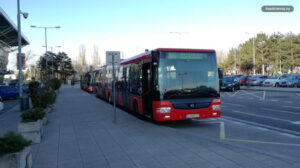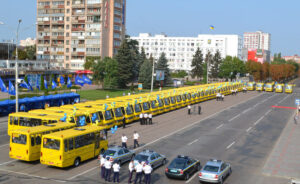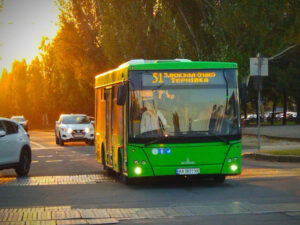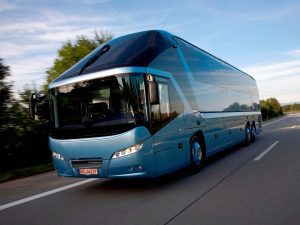
Bratislava Mayor Mateusz Vallo has offered Kiev assistance in attracting world experts in consulting in the restoration of infrastructure, development of the transportation system, said Kiev Mayor Vitali Klitschko after a meeting with his Slovak counterpart.
“Our cities are linked by twinning relations… We agreed on further assistance from Bratislava, in particular in setting up a rehabilitation center for the military, which Kiev is creating. We also discussed the future restoration of Ukraine and Kyiv,” Klitschko wrote in Telegram on Tuesday evening.
Also, according to him, Bratislava will soon hand over 25 city buses to Kiev as aid. Now they are being prepared for shipment, the mayor of the Ukrainian capital said.

Primary registrations of new buses (including minibuses) in Ukraine in June fell by 13%, or by 19 units, as compared to May of this year – down to 147, according to statistics of the association “Ukravtoprom”.
According to the data disclosed in the Association’s Telegram channel, compared to June 2022, when only 32 buses were registered, the market has quadrupled.
Buses of Citroen brand with registration of 64 vehicles (in June 2023 – 3 vehicles) held the leading position last month (as in May), second place was taken by Ataman produced by Cherkasy Bus JSC with registration of 48 vehicles against 41 vehicles in May 2023 and three in June last year.
The third place is held by the Ukrainian Etalon, despite the registration of only six vehicles against 32 in May 2023.
At the same time, according to information in ProZorro, buses of this brand have recently more often won tenders for the purchase of school buses by regions of Ukraine at the expense of local budgets and subventions from the state budget.
Buses Volkswagen with registration of two cars (as in May) maintained the fourth place in the ranking of sales of new buses in June, the same number of registered buses ZAZ, Ford and Turkish Guleyuz.
Moreover, in June one bus by Renault and one by Ruta were registered in Ukraine.
Thus, in January-June 2023 the total number of new buses of all classes in Ukraine was 779 buses. – almost 2.2 times more than during the same period in 2022.

Cherkasskiy Avtobus” JSC, producing small class buses Ataman and trucks on the bases of Japanese Isuzu, plans to increase monthly production of buses on 25 %, till 50 pieces, trucks – on one third, till 40 pieces.
“Now “Cherkassy Bus” produces 40 buses and 30 trucks per month, and from July plans to increase production volumes to 50 buses and 40 trucks,” MP Dmitry Kisilevsky told the Interfax-Ukraine news agency.
In this connection he highlighted the importance for the company of the project on the production of 30 Isuzu trucks with flatbed and crane-manipulator Tadano, which is being implemented in Ukraine and handed over to the State Emergency Service.
Localization of production of the transferred vehicles is about 30%. State Emergency Service of Ukraine will use the vehicles, in particular for demining and clearing the territories affected by the Russian invasion and shelling.
As reported, the project is financed by the Japan International Cooperation Agency JICA, the first six vehicles have already been transferred to the SES.
“Cherkassy Bus” plant plans to hand over another 24 trucks in August-September this year. But JICA plans to participate in further deliveries of vehicles (buses and special trucks). The Ukrainian party is interested in producing these vehicles at Ukrainian enterprises as well,” Kisilevsky told the agency.
According to the Facebook page of the Federation of Employers of Ukraine, the ceremony of handing over Isuzu trucks to the State Emergency Situations Service was attended by Chief of the Isuzu-Ataman Ukraine business, Oleksandr Dorosh, Deputy Economy Minister Ihor Fomenko, Chairman of the State Emergency Situations Service Serhiy Kruk and Japanese Ambassador to Ukraine Matsuda Kuninori who, in particular, noted that Japan may cooperate with Ukraine in manufacturing heavy machinery or special vehicles for transporting people.
Founded in 1994, the Cherkassy Bus plant produces small class buses, as well as other wheeled vehicles based on Isuzu units.
As previously reported, the plant plans to invest 200 mln hryvnia in the production of a larger class of buses.
In 2022, the plant increased its net profit nearly 2.9 times to UAH 65.02 mln, with net income growth by 32.5% to UAH 842.29 mln.

Mykolaivpastrans municipal enterprise of Mykolaiv City Council has announced a tender for the purchase of low-floor buses worth up to EUR4.5 million under the “Urban Public Transport of Ukraine” project, financed by the European Investment Bank (EIB).
According to information in ProZorro on Friday, the relevant announcement was posted in the online version of the EU Official Gazette on April 5. The disclosure of the bids is scheduled for May 31.
According to the announcement, the terms of the tender provide for the supply of buses between 8.2 m and 10.5 m in length, including basic and consumable spare parts, equipment and tools for maintenance and repair, and related services.
The buses must be diesel-powered, with access without steps by at least two doors, 2.55-3.5 m wide, have a passenger capacity of at least 60 people, including at least 24 seated (plus one space for a wheelchair).
The first batch of buses must be delivered no later than five months from the date of receipt of advance payment by the supplier, and the completion of the contract – in 12 months.
According to the website of Mykolaiv City Council, at the end of March this year, the resumption of cooperation with the EIB on the project “Urban public transport of Ukraine” on the local television channel said the head of “Nikolaevpastrans” Alexey Ushakov.
As reported, the previous similar tender within this project was announced in September 2021 with the opening of bids at the end of November. However, the procurement procedure was halted due to the full-scale invasion of Ukraine by the rf.
Nikolaev had attempted to purchase buses within the framework of this program before: the relevant tender was announced in March 2021, it was supposed to purchase buses with the length from 8.8 to 9.5 m.
However, in July of the same year, the tender was canceled after all bids were rejected (they were submitted by the Ukrainian dealer of Minsk Bus Plant – the company Modern Trucks and the Chernihiv Automobile Plant).
“The winner according to all requirements of the tender is the representative of MAZ in Ukraine. However, due to the sanctions imposed by the EU on the Belarusian companies, it was decided to announce a new tender and invite more participants,” explained then in the city council of Nikolaev.
According to the website of the city council, currently 20 vehicles of “Nikolaevpastrans” work on the routes of Nikolaev.
Recently, the city received from the German company three buses “accordion” Mercedes Citaro passenger capacity of up to 150 people.

The sales of new commercial vehicles (including heavy vehicles) in June decreased by 21% compared to June 2019, to 760 units, Ukrautoprom reports.
According to the association, at the same time, the June sales result is 11.8% more than in May this year.
In June, Fiat demonstrated the best sales result, pushing Renault into the second position and managing to increase registrations by 16%, to 118 units.
Renault lost 35% of sales, completing the month with 106 registered cars, in third place, as a year earlier, was occupied by Ford with the registration of 82 cars against 80 in June 2019 and 50 in May this year.
Peugeot ranked fourth, having improved the position in the rating by one step and increased sales by 22%, to 77 vehicles. Belarus’ MAZ closes the top five of the June market of new commercial cars, with 64 registrations in its classification (15% less).
Ukrainian commercial vehicles were not included in the list of the 15 best-selling commercial cars, and Russia’s GAZ ranks 14th with the registration of 12 cars against 39 units in June 2019 and nine units in May of this year.
In total, in the first half of the year, the Ukrainian fleet of trucks and special vehicles was replenished with 4,100 new vehicles, which is a quarter less than in the same period last year.
At the same time, according to the statistics of the association, the bus market of all classes in Ukraine in June decreased by 5% compared to June last year, and almost doubled compared to May of the current year, to 94 buses.

Kyiv in 2020 will buy 273 modern buses, the press service of Kyiv City State Administration has reported, with reference to Kyiv Mayor Vitali Klitschko.
“This year we plan to purchase 273 modern buses. We are constantly updating the capital’s public transport park. Over the past few years, we have bought almost 300 units of public transport. These are modern and comfortable buses, trams and trolleybuses,” Klitschko said on the air of the Ukraine 24 TV Channel.
According to him, the capital is developing a new public transport scheme, which will take into account the possibility of convenient transfers from one type of transport to another. Thus, public transport, in particular, will crowd out minibuses and private buses from the city center.
“This is the practice of megacities around the world. In big cities, to get to the center, you have to pay a lot of money, especially for parking. Therefore, many people in the West use public transport. This positively influences traffic and the environmental situation in city,” Klitschko said.